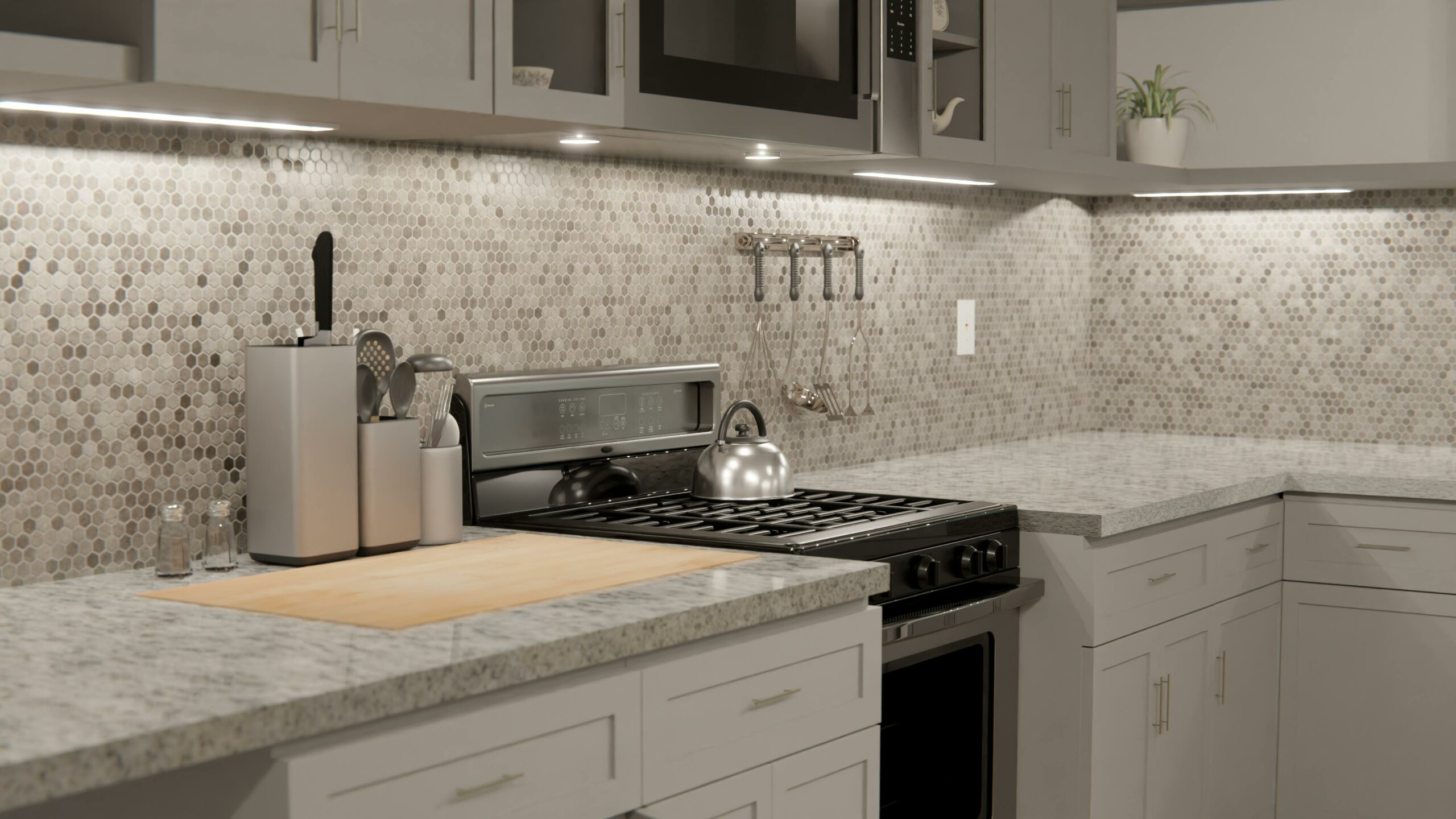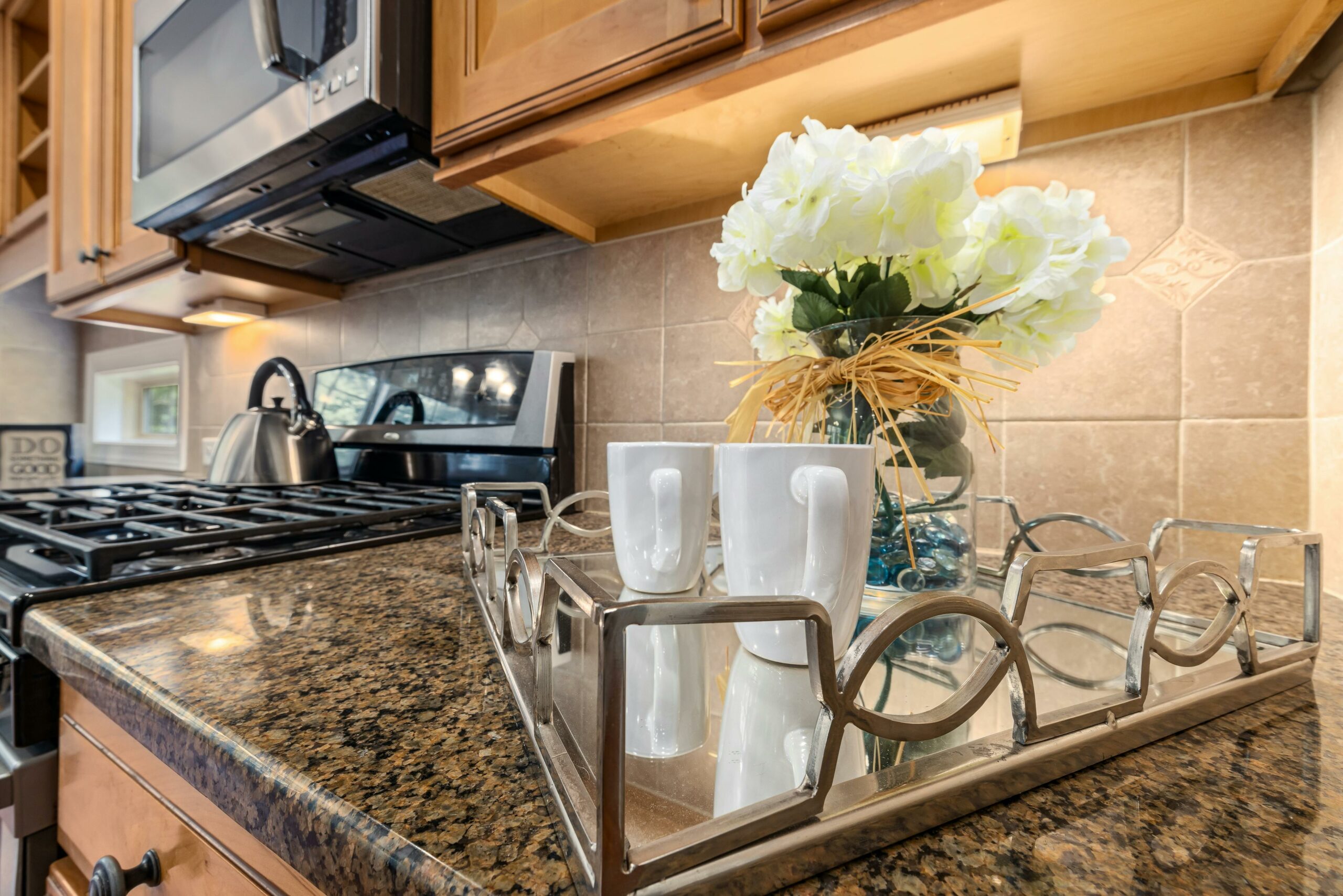When it comes to preserving the elegance and longevity of your home’s surfaces, understanding how to care for quartz countertops is essential. Enhancing the aesthetics of your house while ensuring durability, quartz countertops have become a popular choice among homeowners. However, it requires specific maintenance techniques to keep its charm intact.
The composition makes it a sturdy yet appealing material for your kitchen and bathroom. Knowing its makeup is crucial to understanding why certain cleaning and maintenance techniques work, and some don’t.
Proper maintenance should not be underplayed; regular cleaning is a key element in this journey. With the right approach and care, your quartz countertop can resist damages and sustain its beauty for a considerable duration. But are you aware of the common issues that might haunt your beloved quartz surface?
From the selection of cleaning products to understanding how heat affects the quartz, everything plays a significant role in maintaining its beauty. The crucial part of maintaining the shine and luster is also a part of this journey, ensuring your countertop looks as good as new.
This article aims to provide an in-depth guide on how to deal with stains effectively, when to seal, and the role of sealing in caring for quartz countertops. Join us as we explore the world of quartz countertop care.

Understanding the Composition
Quartz countertops are made from a combination of natural quartz crystals and resin. The quartz crystals are mined from quarries and then crushed into a fine powder. The powder is then mixed with resin and other additives to create a durable and beautiful countertop material.
One of the key components is the quartz itself. Quartz is a naturally occurring mineral that is known for its hardness and durability. It is one of the hardest minerals on Earth, making it an ideal material for countertops that need to withstand daily wear and tear.
In addition to quartz, the countertops also contain resin. The resin acts as a binding agent, holding the quartz crystals together and giving the countertops their strength and durability. The resin also helps to give the countertops their smooth and shiny finish.
Other additives may also be included in the composition of quartz countertops. These additives can include pigments to give the countertops their color, as well as antimicrobial agents to help prevent the growth of bacteria and mold.
Overall, the composition makes them a highly desirable choice for kitchens and bathrooms. They are not only beautiful and stylish, but also incredibly durable and easy to maintain.

The Importance of Regular Cleaning
Regular cleaning is essential for maintaining the beauty and longevity. Quartz is a durable and low-maintenance material, but it still requires proper care to keep it looking its best.
One of the main reasons why regular cleaning is important for quartz countertops is to prevent the buildup of dirt, grime, and bacteria. Even though quartz is non-porous and resistant to stains, it can still harbor bacteria if not cleaned regularly. By cleaning your countertops regularly, you can ensure that they are safe and hygienic for food preparation and everyday use.
Regular cleaning also helps to preserve the shine and luster. Over time, quartz can become dull and lose its natural beauty due to the accumulation of residue and oils. By cleaning the surface regularly, you can remove these substances and restore the countertop’s original shine.
In addition to maintaining cleanliness and appearance, regular cleaning can also help prevent damage. Certain substances, such as acidic or abrasive cleaners, can cause etching or scratching on the surface of the quartz. By using gentle and non-abrasive cleaning products, you can avoid these issues and keep your countertops in pristine condition.
Furthermore, regular cleaning allows you to identify and address any potential issues with your quartz countertops early on. By inspecting the surface regularly, you can spot any signs of damage, such as chips or cracks, and take the necessary steps to repair or replace the affected areas. This proactive approach can save you time and money in the long run.
Overall, regular cleaning is crucial for maintaining the beauty, hygiene, and durability of your quartz countertops. By incorporating a simple cleaning routine into your daily or weekly tasks, you can ensure that your countertops remain in excellent condition for years to come.

Proper Maintenance Techniques
Proper maintenance is essential to keep your quartz countertops looking their best and ensuring their longevity. Here are some techniques to help you maintain your quartz countertops:
1. Regular Cleaning
Regular cleaning is crucial for keeping your quartz countertops free from dirt, stains, and bacteria. Use a mild soap or a pH-neutral cleaner and a soft cloth or sponge to wipe down the surface. Avoid using abrasive cleaners or scrub brushes, as they can damage the quartz.
2. Preventing Damages
To prevent damages, always use cutting boards or chopping blocks when preparing food on your quartz countertops. Avoid placing hot pots or pans directly on the surface, as extreme heat can cause thermal shock and lead to cracks or discoloration.
3. Identifying Common Issues
It’s important to be aware of common issues that can occur with quartz countertops, such as chipping, cracking, or staining. Regularly inspect your countertops for any signs of damage and address them promptly to prevent further issues.
4. Choosing the Right Cleaning Products
When selecting cleaning products for your quartz countertops, opt for those specifically designed for quartz surfaces. Avoid using harsh chemicals, bleach, or abrasive cleaners, as they can damage the surface and strip away the protective sealant.
5. Managing Stains
If you encounter stubborn stains on your quartz countertops, create a paste using baking soda and water. Gently scrub the stain with the paste using a soft cloth or sponge. Rinse thoroughly and dry the surface to prevent any residue.
6. The Role of Sealing
Quartz countertops are non-porous and do not require sealing. However, if you notice that liquids are starting to absorb into the surface, it may be time to reseal your countertops. Consult with a professional to ensure proper sealing.
7. Maintaining Shine and Luster
To maintain the shine and luster of your quartz countertops, regularly polish them using a quartz countertop polish. This will help remove any dullness or scratches and restore the natural shine of the surface.
By following these proper maintenance techniques, you can keep your quartz countertops looking beautiful and ensure their longevity for years to come.
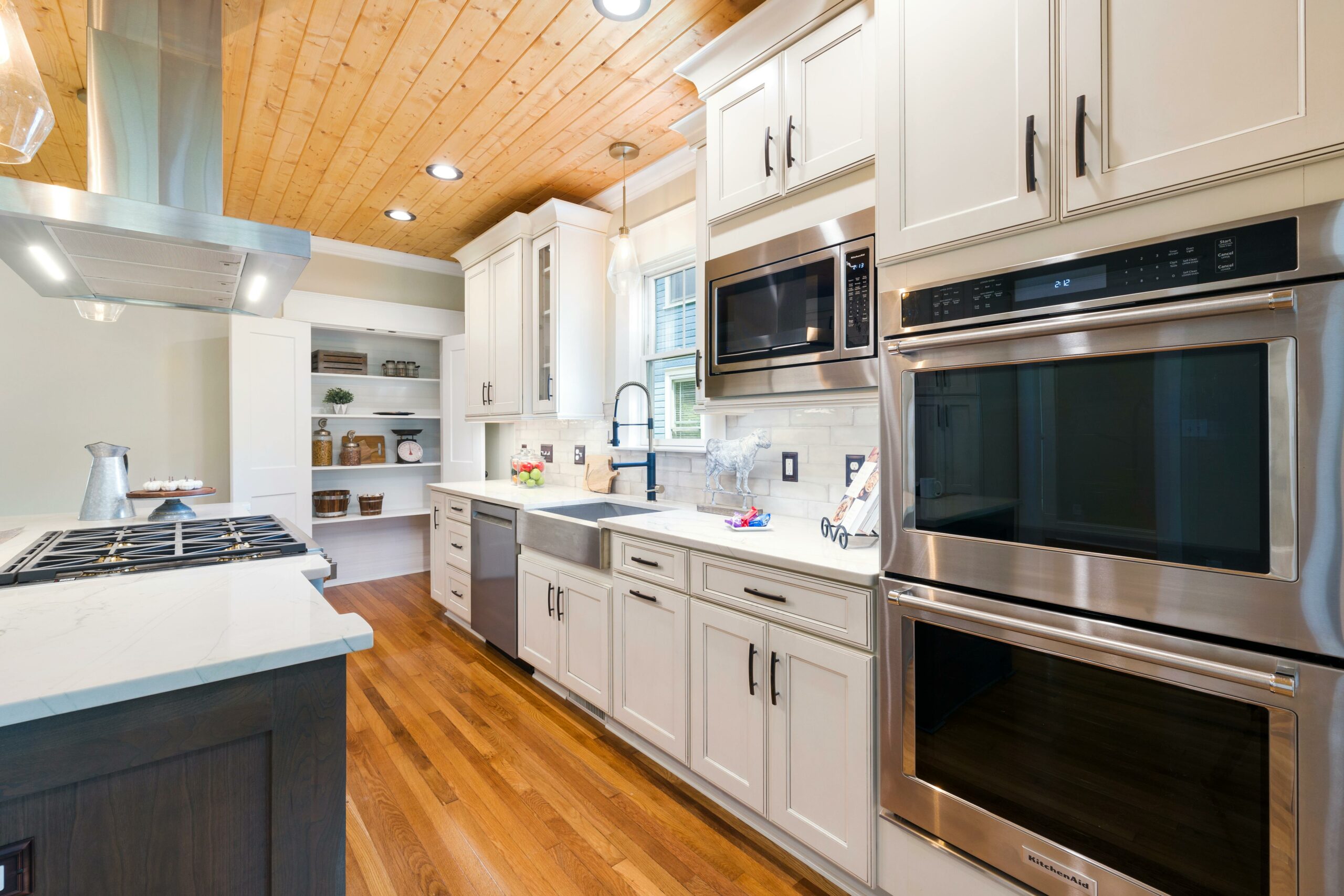
Preventing Damages to Your Quartz Countertops
Quartz countertops are known for their durability and resistance to stains, scratches, and heat. However, it is still important to take proper precautions to prevent any damages that can occur over time. By following these guidelines, you can ensure that your quartz countertops stay in pristine condition for years to come.
1. Avoid placing hot items directly on the surface
Although quartz countertops are heat resistant, it is best to use trivets or hot pads when placing hot pots, pans, or other items directly on the surface. This will help prevent any potential cracking or discoloration that can occur from extreme heat.
2. Use cutting boards and avoid cutting directly on the surface
While quartz countertops are scratch resistant, it is still recommended to use cutting boards when preparing food. Sharp knives and utensils can potentially leave marks or scratches on the surface if used directly. By using cutting boards, you can protect the surface from any potential damage.
3. Clean up spills immediately
Even though quartz countertops are resistant to stains, it is still important to clean up spills as soon as possible. Liquids such as wine, coffee, or acidic substances can potentially leave stains if left sitting for an extended period. By wiping up spills immediately, you can prevent any permanent discoloration.
4. Avoid using abrasive cleaners or scrub brushes
When cleaning your quartz countertops, it is best to use mild soap and water or a non-abrasive cleaner specifically designed for quartz surfaces. Avoid using harsh chemicals or abrasive scrub brushes, as they can potentially damage the surface and remove the protective sealant.
5. Use coasters and placemats
To prevent any potential damage from glasses or plates, it is recommended to use coasters and placemats. This will help protect the surface from any scratches or marks that can occur from everyday use.
6. Avoid placing heavy objects on unsupported areas
While quartz countertops are sturdy, it is important to avoid placing heavy objects on unsupported areas. This can potentially cause the surface to crack or chip. Use caution when placing heavy items such as appliances or large pots on the countertop and ensure that they are properly supported.
By following these preventive measures, you can keep your quartz countertops looking beautiful and extend their lifespan. Regular maintenance and proper care will ensure that your countertops remain a stunning addition to your kitchen or bathroom for years to come.

Identifying Common Issues with Quartz Countertops
Quartz countertops are known for their durability and low maintenance. However, like any other material, they can also experience common issues that need to be addressed. By being aware of these issues, you can take the necessary steps to prevent and resolve them, ensuring the longevity and beauty of your quartz countertops.
1. Scratches
While quartz countertops are resistant to scratches, they are not entirely scratch-proof. Sharp objects or abrasive materials can still cause scratches on the surface. To prevent scratches, always use cutting boards and avoid using knives directly on the countertop. If scratches do occur, you can use a non-abrasive cleaner and a soft cloth to buff them out.
2. Stains
Quartz countertops are highly resistant to stains, thanks to their non-porous nature. However, certain substances like red wine, coffee, or oil can still leave stains if not cleaned up promptly. To prevent stains, wipe up spills immediately and clean the surface with a mild detergent and water. For stubborn stains, you can use a non-abrasive cleaner specifically designed for quartz countertops.
3. Chips and Cracks
While quartz countertops are known for their durability, they are not indestructible. Heavy impact or excessive force can cause chips or cracks on the surface. To prevent chips and cracks, avoid dropping heavy objects on the countertop and use cutting boards or trivets when placing hot pots or pans. If chips or cracks do occur, it is best to contact a professional for repair.
4. Discoloration
Quartz countertops are resistant to discoloration from normal household use. However, prolonged exposure to direct sunlight or heat can cause the color to fade or change. To prevent discoloration, avoid placing hot objects directly on the countertop and use heat-resistant pads or trivets. If discoloration does occur, it is best to consult a professional for advice on how to restore the original color.
5. Seam Visibility
Quartz countertops are typically installed with seams to accommodate larger countertop areas. While installers strive to make the seams as inconspicuous as possible, they may still be visible. To minimize seam visibility, choose a quartz color and pattern that can help camouflage the seams. Additionally, proper cleaning and maintenance can help keep the seams in good condition.
By understanding and addressing these common issues, you can ensure that your quartz countertops remain in excellent condition for years to come. Regular cleaning, proper maintenance, and taking preventive measures will help you enjoy the beauty and functionality of your quartz countertops for a long time.
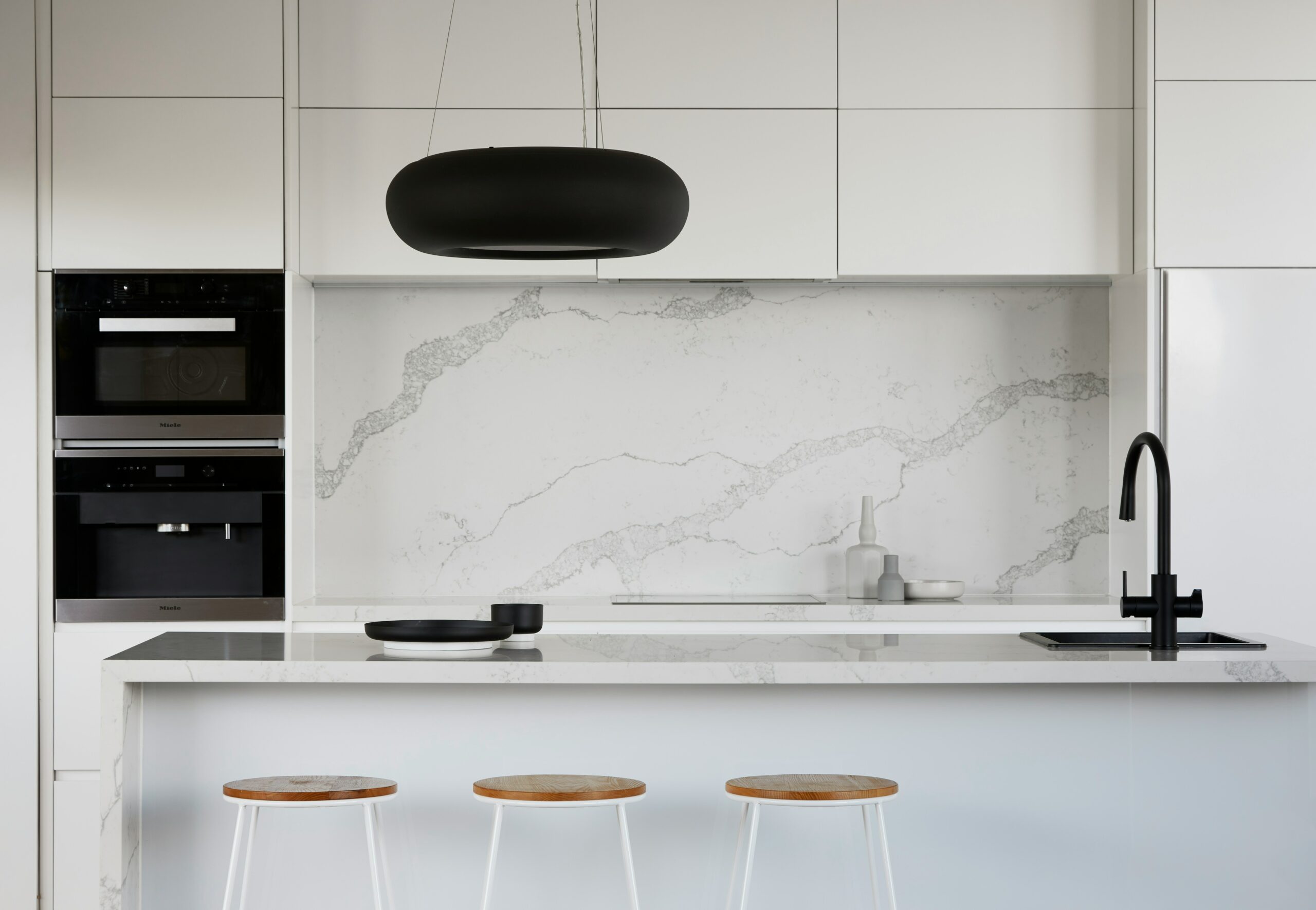
Choosing the Right Cleaning Products for Quartz Countertops
When it comes to cleaning quartz countertops, using the right products is crucial to maintain their beauty and longevity. Quartz is a durable and non-porous material, but it still requires regular cleaning to keep it looking its best.
Understanding the Composition of Quartz Countertops
Before diving into the cleaning products, it’s important to understand the composition of quartz countertops. Quartz countertops are made from a combination of natural quartz stone and resin binders. This creates a strong and durable surface that is resistant to stains and scratches.
The Importance of Regular Cleaning for Quartz Countertops
Regular cleaning is essential for quartz countertops to prevent the buildup of dirt, grime, and bacteria. Cleaning them regularly not only keeps them looking clean and shiny but also helps to maintain their hygienic properties.
Proper Quartz Countertop Maintenance Techniques
When it comes to cleaning quartz countertops, it’s important to use the right techniques to avoid damaging the surface. Avoid using abrasive cleaners or scrub brushes that can scratch the surface. Instead, opt for gentle cleaners and soft cloths or sponges.
Preventing Damages to Your Quartz Countertops
Prevention is key when it comes to maintaining quartz countertops. Avoid placing hot pans or pots directly on the surface, as extreme heat can cause thermal shock and potentially damage the countertop. Always use trivets or hot pads to protect the surface.
Identifying Common Issues with Quartz Countertops
Quartz countertops can face common issues such as staining, etching, and dullness. Choosing the right cleaning products can help address these issues effectively without causing any further damage.
Managing Stains on Quartz Countertops
If you notice any stains on your quartz countertops, it’s important to address them promptly. Avoid using harsh chemicals or abrasive cleaners, as they can damage the surface. Instead, opt for gentle cleaners specifically designed for quartz countertops.
The Role of Sealing in Caring for Quartz Countertops
Unlike natural stone countertops, quartz countertops do not require sealing. The resin binders used in the manufacturing process make them non-porous and resistant to staining. However, using a quartz cleaner with a built-in sealer can help enhance the shine and protect the surface.
Maintaining the Shine and Luster of Quartz Countertops
To maintain the shine and luster of your quartz countertops, regular cleaning with a quartz-specific cleaner is essential. Avoid using acidic or abrasive cleaners that can dull the surface. Instead, opt for gentle cleaners and buff the surface with a soft cloth to restore its shine.
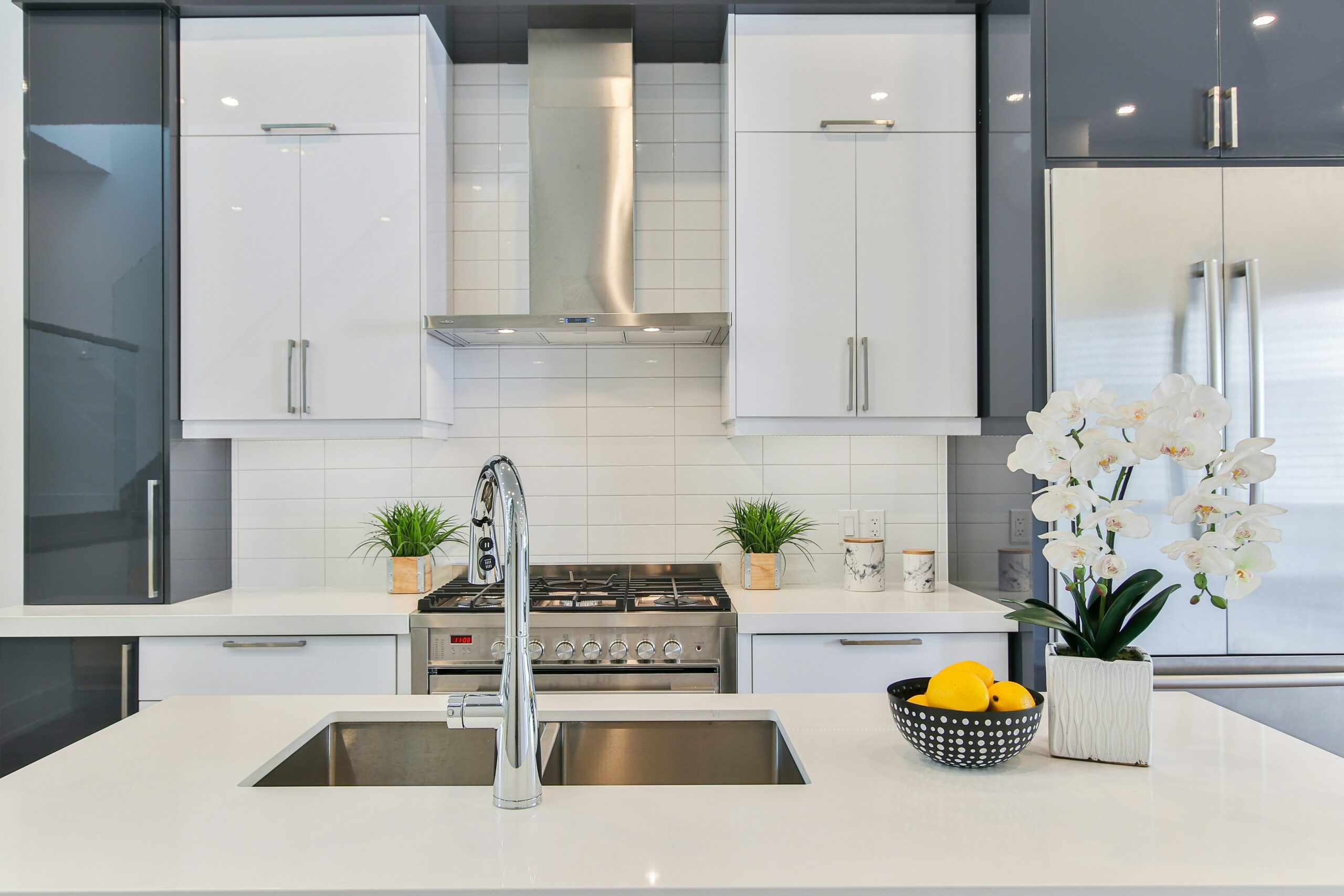
How Heat Affects Quartz Countertops
Quartz countertops are known for their durability and resistance to many types of damage. However, it’s important to understand that they are not completely impervious to heat. Excessive heat can cause irreversible damage to quartz countertops, leading to cracks, discoloration, and even complete failure of the countertop.
The Science Behind Quartz Countertops and Heat
Quartz countertops are made up of approximately 90% natural quartz crystals and 10% resins, polymers, and pigments. While quartz is a highly heat-resistant material, the resins and polymers used in the manufacturing process have a lower tolerance for heat. This means that extreme temperatures can cause the resins to melt or become discolored, compromising the integrity and appearance of the countertop.
Effects of Heat on Quartz Countertops
When exposed to high heat, quartz countertops can experience several negative effects:
-
- Cracking: The sudden change in temperature can cause the quartz to expand or contract rapidly, leading to cracks in the countertop surface.
-
- Discoloration: Prolonged exposure to heat can cause the resins and pigments in the quartz to change color, resulting in unsightly stains or discoloration.
-
- Warping: Excessive heat can cause the quartz countertop to warp or bend, making it uneven and potentially unusable.
Preventing Heat Damage
To protect your quartz countertops from heat damage, it’s important to follow these guidelines:
-
- Use trivets or hot pads: Always use trivets or hot pads when placing hot pans, pots, or other cookware on your quartz countertops. This will create a barrier between the heat source and the countertop surface.
-
- Avoid direct contact with heat: Do not place hot items directly on the quartz countertop surface. Instead, use a heat-resistant mat or trivet to protect the surface from direct heat.
-
- Be cautious with heat-generating appliances: Avoid placing heat-generating appliances, such as crockpots or toaster ovens, directly on the quartz countertop. Instead, place them on a heat-resistant mat or use a cutting board as a protective barrier.
By following these preventive measures, you can ensure that your quartz countertops remain in pristine condition and avoid the costly repairs or replacements that heat damage can cause.

Managing Stains
Quartz countertops are known for their durability and resistance to stains. However, even with their impressive qualities, it is still possible for stains to occur on these surfaces. In order to effectively manage stains on quartz countertops, it is important to follow the proper cleaning and maintenance techniques.
1. Immediate Action: When a stain occurs on your quartz countertop, it is important to take immediate action to prevent it from setting in. Use a soft cloth or sponge to blot the stain, avoiding any scrubbing or rubbing motions that could further spread the stain.
2. Gentle Cleaning: For most stains, a gentle cleaning solution will be sufficient to remove them from your quartz countertop. Mix a mild dish soap with warm water and apply it to the stained area. Use a soft cloth or sponge to gently scrub the stain, working in circular motions. Rinse the area thoroughly with clean water and dry it with a soft towel.
3. Stubborn Stains: In some cases, stubborn stains may require a stronger cleaning solution. You can create a paste by mixing baking soda with water and apply it to the stained area. Let it sit for a few minutes before gently scrubbing with a soft cloth or sponge. Rinse the area thoroughly and dry it with a soft towel.
4. Avoid Harsh Chemicals: When managing stains on quartz countertops, it is important to avoid using harsh chemicals or abrasive cleaners. These can damage the surface of the countertop and cause discoloration. Stick to gentle cleaning solutions and avoid using any products that contain bleach or ammonia.
5. Prevention: The best way to manage stains on quartz countertops is to prevent them from occurring in the first place. Use cutting boards and trivets to protect the surface from hot pans or sharp objects. Wipe up spills immediately to prevent them from seeping into the countertop. Avoid placing any acidic or staining substances directly on the surface.
6. Professional Help: If you have tried all the above techniques and the stain still persists, it may be time to seek professional help. Contact a professional quartz cleaner or installer who can assess the stain and provide the best solution for removal.
By following these techniques and taking proactive measures, you can effectively manage stains on your quartz countertops and keep them looking beautiful for years to come.

The Role of Sealing in Caring
Sealing is an important step in maintaining the beauty and longevity of your quartz countertops. While quartz is a durable and low-maintenance material, it is still susceptible to staining and damage if not properly cared for. Sealing helps to protect the surface of the countertops and prevent any liquids or substances from penetrating the pores of the quartz.
When are sealed, a protective barrier is created on the surface. This barrier acts as a shield against spills, stains, and other potential damages. It helps to repel liquids, making it easier to clean up any spills before they have a chance to seep into the quartz.
Not only does sealing protect against stains, but it also helps to maintain the shine and luster of the quartz. Over time, exposure to sunlight and regular use can cause the quartz to lose its shine. Sealing helps to prevent this by creating a barrier that reflects light and keeps the surface looking glossy and new.
It is important to note that not all quartz countertops require sealing. Some manufacturers produce quartz slabs that are already sealed during the manufacturing process. However, it is still recommended to check with the manufacturer or installer to determine if your specific countertops need to be sealed or resealed.
Sealing is a relatively simple process that can be done by a professional or as a DIY project. The countertop surface should be thoroughly cleaned and dried before applying the sealant. The sealant is typically applied in a thin, even layer and allowed to dry completely before using the countertops.
It is recommended to reseal every 1 to 3 years, depending on the level of use and exposure to potential stains. Regular maintenance and cleaning can also help to prolong the effectiveness of the sealant and keep your quartz countertops looking their best.
In conclusion, sealing plays a crucial role in caring for quartz countertops. It helps to protect against stains, maintain the shine and luster, and prolong the lifespan of the countertops. By properly sealing and maintaining your quartz countertops, you can ensure they remain beautiful and functional for years to come.

Maintaining the Shine and Luster
Quartz countertops are known for their durability and low maintenance requirements. However, to keep them looking their best and to maintain their shine and luster, it is essential to follow proper care and maintenance techniques.
Regular Cleaning
Regular cleaning is crucial for keeping looking shiny and lustrous. Use a mild, non-abrasive cleaner and a soft cloth or sponge to wipe away any spills or stains. Avoid using harsh chemicals or abrasive scrubbers, as they can damage the surface of the quartz.
Gentle Cleaning Techniques
When cleaning, it is important to use gentle techniques. Avoid scrubbing too hard or using excessive force, as this can cause scratches or dull the surface. Instead, use gentle circular motions to clean the countertop effectively without causing any damage.
Avoiding Harsh Chemicals
Are resistant to stains and scratches, but they can still be damaged by certain chemicals. Avoid using harsh chemicals such as bleach, abrasive cleaners, or acidic substances like vinegar or lemon juice. Instead, opt for mild, pH-neutral cleaners specifically designed for quartz surfaces.
Preventing Scratches
To maintain the shine and luster it is essential to prevent scratches. Avoid dragging heavy objects across the surface, and always use cutting boards or trivets when placing hot pots or pans on the countertop. Additionally, use caution when using sharp utensils or knives directly on the surface to avoid scratching.
Polishing and Buffing
Periodically polishing and buffing can help restore their shine and luster. Use a non-abrasive polishing compound specifically designed for quartz surfaces and follow the manufacturer’s instructions. Gently buff the surface in circular motions to achieve a glossy finish.
Avoiding Direct Sunlight
Direct sunlight can cause quartz countertops to fade or discolor over time. To maintain their shine and luster, it is advisable to install window treatments or use UV-protective films on windows to minimize exposure to direct sunlight. This will help preserve the color and appearance of the quartz.
Regular Sealing
While quartz countertops are non-porous and do not require sealing like natural stone countertops, it is still recommended to regularly check and reseal the seams and edges. This will help prevent any moisture or dirt from seeping in and affecting the shine and luster of the quartz.
By following these maintenance techniques, you can ensure that maintain their shine and luster for years to come. With proper care and regular cleaning, your countertops will continue to be a beautiful and functional addition to your kitchen or bathroom.


